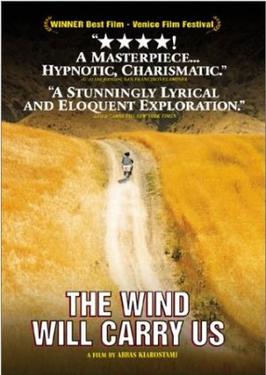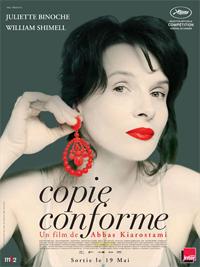Related Research Articles

Abbas Kiarostami was an Iranian film director, screenwriter, poet, photographer, and film producer. An active filmmaker from 1970, Kiarostami had been involved in the production of over forty films, including shorts and documentaries. Kiarostami attained critical acclaim for directing the Koker trilogy (1987–1994), Close-Up (1990), The Wind Will Carry Us (1999), and Taste of Cherry (1997), which was awarded the Palme d'Or at the Cannes Film Festival that year. In later works, Certified Copy (2010) and Like Someone in Love (2012), he filmed for the first time outside Iran: in Italy and Japan, respectively. His films Where Is the Friend's Home? (1987), Close-Up, and The Wind Will Carry Us were ranked among the 100 best foreign films in a 2018 critics' poll by BBC Culture. Close-Up was also ranked one of the 50 greatest movies of all time in the famous decennial Sight & Sound poll conducted in 2012.

The cinema of Iran, or of Persia, refers to the film industry in Iran. Particularly Iranian art films have garnered international recognition. Iranian films are usually written and spoken in the Persian language.

Close-Up is a 1990 Iranian docufiction written, directed and edited by Abbas Kiarostami. The film tells the story of the real-life trial of a man who impersonated film-maker Mohsen Makhmalbaf, conning a family into believing they would star in his new film. It features the people involved, acting as themselves. A film about human identity, it helped to increase recognition of Kiarostami internationally.

The Wind Will Carry Us is a 1999 Iranian film written and directed by Abbas Kiarostami. The title is a reference to a poem written by the modern Iranian poet Forough Farrokhzad. In the film, a journalist posing as a city engineer arrives in a Kurdish village to document the locals' mourning rituals that anticipate the death of an old woman. However, she remains alive, and the journalist is forced to slow down and appreciate the lifestyle of the village.
The Koker trilogy is a series of three films directed by acclaimed Iranian film-maker Abbas Kiarostami: Where Is the Friend's Home? (1987), Life, and Nothing More... and Through the Olive Trees (1994). The designation was made by film theorists and critics, rather than by Kiarostami himself, who resists the designation and notes that the films are connected only by the accident of place. He has suggested that it might be more appropriate to consider the latter two titles plus Taste of Cherry (1997) as a trilogy, since these are connected by the theme of life's preciousness.
Toothache is a 1980 Iranian short educational film written, directed and edited by Abbas Kiarostami. It is also known as Dental Hygiene which has let to some confusion and resulted in the film being listed under the latter title as an additional entry in some online filmographies, e.g. on IMDb.
The Journey is a 1995 Iranian film directed by Alireza Raisian and written by Abbas Kiarostami. The film follows Farhad Sadri and his family, as their home in Tehran is bombed during the Gulf War. The family moves to northern Iran, and during their travels they experience special moments.
Five, also known as Five Dedicated to Ozu, is a 2003 Iranian documentary film directed by Abbas Kiarostami. The film consists of five long shots, averaging about 16 minutes each. Four of the five have fixed camera positions.

ABC Africa is a 2001 Iranian documentary feature film directed by Abbas Kiarostami. It was screened out of competition at the 2001 Cannes Film Festival.

Tickets is a 2005 comedy-drama anthology film directed by Ermanno Olmi, Abbas Kiarostami and Ken Loach. It was written by Ermanno Olmi, Abbas Kiarostami, and Paul Laverty. Three interconnected stories unfold on a train journey from Innsbruck to Rome.
Roads of Kiarostami is a 2005 Iranian documentary film directed by Abbas Kiarostami.

Bahman Kiarostami is an Iranian film director, cinematographer, film editor and film producer. He is the son of the late critically acclaimed Abbas Kiarostami. The main theme in Kiarostami's films are art and music.
Iranian New Wave refers to a movement in Iranian cinema. It started in 1964 with Hajir Darioush's second film Serpent's Skin, which was based on D.H. Lawrence's Lady Chatterley's Lover featuring Fakhri Khorvash and Jamshid Mashayekhi. Darioush's two important early social documentaries But Problems Arose in 1965, dealing with the cultural alienation of the Iranian youth, and Face 75, a critical look at the westernization of the rural culture, which was a prizewinner at the 1965 Berlin Film Festival, also contributed significantly to the establishment of the New Wave. In 1968, after the release of Shohare Ahoo Khanoom directed by Davoud Mollapour, The Cow directed by Dariush Mehrjui followed by Masoud Kimiai's Qeysar in 1969, Nasser Taqvai's Tranquility in the Presence of Others, and immediately followed by Bahram Beyzai's Downpour, the New Wave became well established as a prominent cultural, dynamic and intellectual trend. The Iranian viewer became discriminating, encouraging the new trend to prosper and develop.
The Iranian film director Abbas Kiarostami is known for uses of certain themes and cinematic techniques that are instantly recognizable in his work, from the use of child protagonists and stories that take place in rural villages, to conversations that unfold inside cars utilizing stationary mounted cameras. He often undertook a documentary style of filmmaking within narrative works, and frequently employs contemporary Iranian poetry in dialogue, movie titles, and in the thematic elements of his pictures.

Shirin is a 2008 Iranian drama film directed by Abbas Kiarostami. The film is considered by some critics as a notable twist in the artistic career of Kiarostami.

Certified Copy is a 2010 art film written and directed by Abbas Kiarostami. Set in Tuscany, the film focuses on a British writer and a French antiques dealer, whose relationship undergoes an odd transformation over the course of a day. The film was a French-majority production, with co-producers in Italy and Belgium. The dialogue is in English, French and Italian.

24 Frames is a 2017 Iranian experimental film directed by Abbas Kiarostami. It was his final feature film before his death in July 2016. It was posthumously shown in the 70th Anniversary Events section at the 2017 Cannes Film Festival.

Lessons with Kiarostami is a book written by Abbas Kiarostami, edited by Paul Cronin and with a foreword by acclaimed British director Mike Leigh. The book was published, simultaneously in English and Persian, shortly before Kiarostami's death. Drawn from Cronin's notes made at a series of workshops around the world, as led by Kiarostami, the text is written in the first person, from Kiarostami's point of view, and details his working methods and approach to poetic cinema. Lessons with Kiarostami was released alongside various volumes of English translations of Kiarostami's poetry, including In the Shadow of Trees. A Turkish translation and a Simplified Chinese translation of the book were published in 2017, and a Complex Chinese translation in 2018.
The Final exam is a 2017 Iranian drama film directed by Iranian director Adel Yaraghi and co-written by Yaraghi and the late Iranian acclaimed artist Abbas Kiarostami. It was produced by Iranian producer Mostafa Shayesteh which stars Shahab Hosseini.